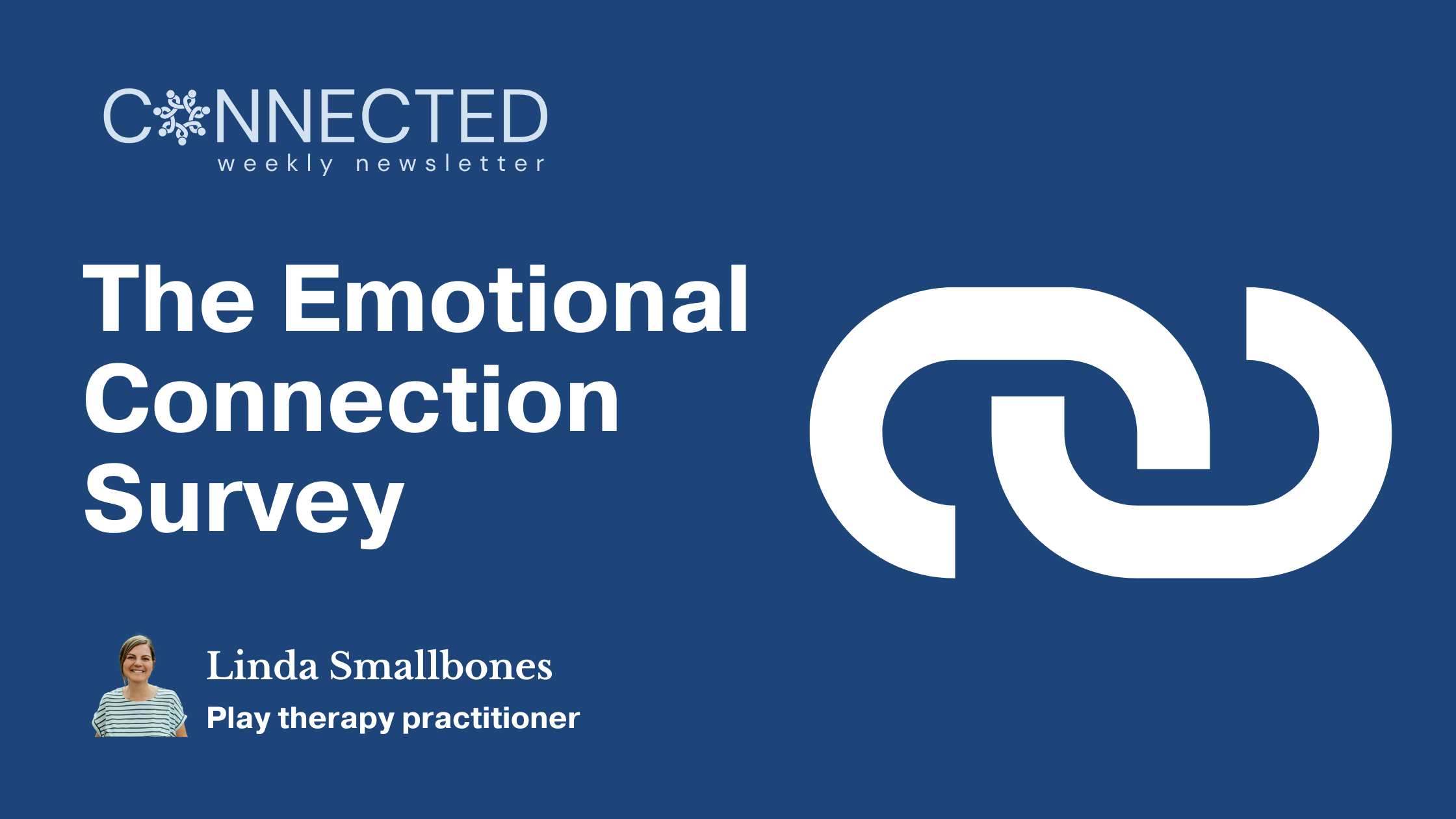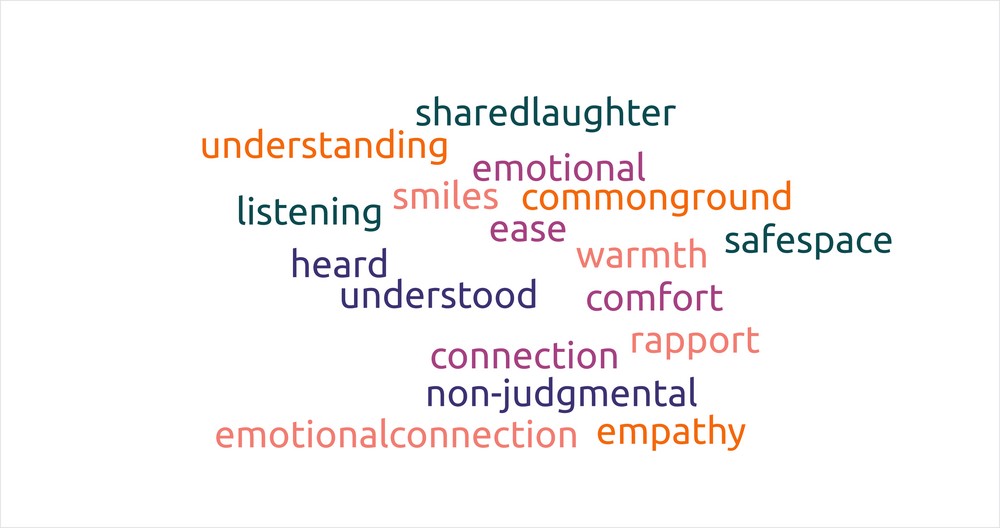The Emotional Connection Survey: A re-visit.
Explore survey insights on emotional connection, children's behaviour, and parenting responses. Learn practical ways to foster connection and overcome obstacles.

In 2023 I sent out a survey to informally gather your thoughts and feelings about emotional connection. Thank you to all who responded! I want to let you know that the survey is still open and you can take it any time.
This is an updated re-post of that original blog.
Emotional connection can sound a little "airy fairy" maybe because it means slightly different to every single one of us! It's like at my last job when my boss would say "I'm not exactly sure what I want from this, but I will know it when I see it." One of the purposes of the survey is to prompt people to think about how they would define what connection looks and feels like to them because when you have experiences of it, you know.
We know it and feel it when we have experienced emotional connection with someone. Sometimes we can get so stuck in our heads about wanting to do all the right things that we forget to tune into our hearts and bodies. I hope that the survey questions can help you to think (and feel) a little bit about what emotional connection means to you and your child.
When emotional connection is hard
Recently, we watched the 1997 movie, Good Will Hunting with our teenage daughter (language in the movie is very dodgy and a few coarse talk moments, just a heads up in case you're thinking of watching it). A central theme of the movie in both Matt Damon and Robin Williams characters is fear of emotional connection. One of them from having experienced abuse his whole short life and the other from significant loss and mourning (and early childhood abuse).
Adverse childhood experiences, trauma and loss can interrupt the ability to build healthy emotional connections with others. In fact, to some, emotional connection can feel extremely scary and unsafe when every person who you've loved has let you down in some way.

On to the survey
I really love the process of doing these surveys, so if you have any ideas for future survey topics please let me know. If you’d still like to take this survey, you are so welcome to! You can take it completely anonymously.
(Survey questions are in bold, responses in italics)
The wordcloud below was generated from the answer to this question:
“How do you know when you have a connection with someone?”

Which of these words resonate with you when it comes to emotional connection?
“How do you behave when you are needing connection with others?”
I talk a lot
I ask a lot of personal questions…if it goes wrong it can come off as me being needy…
I can get hyper, and try really hard, maybe too hard…or beat myself up.
I am quieter than normal.
I message a few different people and see who responds. I am more chatty and try to use humour to engage them.
I look for physical closeness. I want to talk about feelings. Or I buy a gift for the person I want to connect with as a gesture of wanting to be close.
It’s really worth thinking about how our need for connection manifests in our behaviour. We may not be aware of it until we really give it some thought. If we look at the responses, not all of our behaviour is necessarily inviting of connection with others. In our drive to get needs met, we can sometimes project disconnecting/unappealing behaviour! UNLESS, the other person sees through the behaviour to the need we have for making a connection at that point. The other person can choose to respond, or not.
This is important when it comes to how our children behave when they are needing connection. It may look like “bad” behaviour, but we need to be patient and look a little deeper before we give in to exasperation!
“Do you recognise when your child is needing connection with you? How do they behave?”
I so sometimes, I have two very different children. One will seek comfort in the form of hugs and physical touch and the other one will act out and withdraw.
Yes! They get super duper needy and I start feeling irritated by them.
I don’t have kids but I have noticed that they make noise and run around and want you to play with them.
I do. My son will act out, need reassurance and verbal connection, he needs to be heard. My daughter will become very needy and say things like “you don’t tell me I’m special.”
I respond positively, although sometimes I feel guilt as if I am not providing enough for them emotionally.
I recognise it when my child (4 years old) cries for no apparent reason. He also just comes closer to me, prompting me to hold him.
My son is not naturally affectionate, so when he asks for back rubs I know he wants me a bit closer!

Have a think about when your child’s behaviour is telling you they need you! This may save some heartache as when you respond with connection, their “bad”/acting out behaviour dissipates and they settle into the love you’re pouring out.
As for feeling guilt, yup, that gets all of us at different times. But isn’t it a wonderful affirmation of the safe space you have created for your child when they can ask you (even if mostly indirectly) for what they need?
There is a natural rhythm to connection that includes times of withdrawal and space. We cannot be 100% emotionally connected 100% of the time. There are natural breaks like going to work and school, or bed time. The re-connections physically and emotionally are important transition spaces and opportunities. We may “miss” a connection opportunity in these transitions and then observe a connection-seeking behaviour. Be on the look out for these! It is completely normal to miss connection opportunities because we are human!! Repair is always possible. We can retrace our steps and give a hug, say sorry, and give an affirmation "I love you!".
Always, always consider the different expressions and needs of different children.
“How do you respond when you recognise your child’s need for connection?”
I will hug and kiss my daughter and spend time with her one on one.
The one child I can give a hug or sing a silly song and that will suffice. The other needs to be told he is seen…and then he needs me to reach out to him. He needs deep pressure to start calming down. All his behaviour calms down when he knows I see him and he feels heard.
I settle down and try see how and what they need and set aside time for that.
When I am really tired and depleted myself, I really battle to meet connection needs – especially at the end of a long day and more towards the end of a long week! But, I do negotiate as they get older what I can do with them and when. Also, I try micro-connections wherever possible – a quick squeeze or a tickle, pull a funny face at them or just ask them how they’re doing while we make a cup of tea.
I get on my knees to his level, look him in the eyes and ask about what is wrong. Then, I give him a big hug.
“Over the past year, what has been an obstacle(s) to connection for you?”
Time and work. And maybe kids
People have their own lives, issues, difficulties and sometimes people have time for you and sometimes they don’t.
Time, depression, lack of finances.
I feel like I’m jumping from place to place. School and mom routine means a lot of time… that I don’t get to nurture friendships or connections.
A lack of emotional energy when I do have time!
My obstacles have been feeling not heard, not considered, not seen and not shown affection.
How about you? What has been your biggest obstacle to connection?
Emotional Connection is possible
If you're a parent struggling to connect with your child, or wanting to increase your capacity to build that connection, I have created a process called Parenting for Connection. I have spent time over the past two years upgrading the process. It is an 8 week course in an online format. You can find out more about it on my website here.
In the meantime, you can take the emotional connection survey!